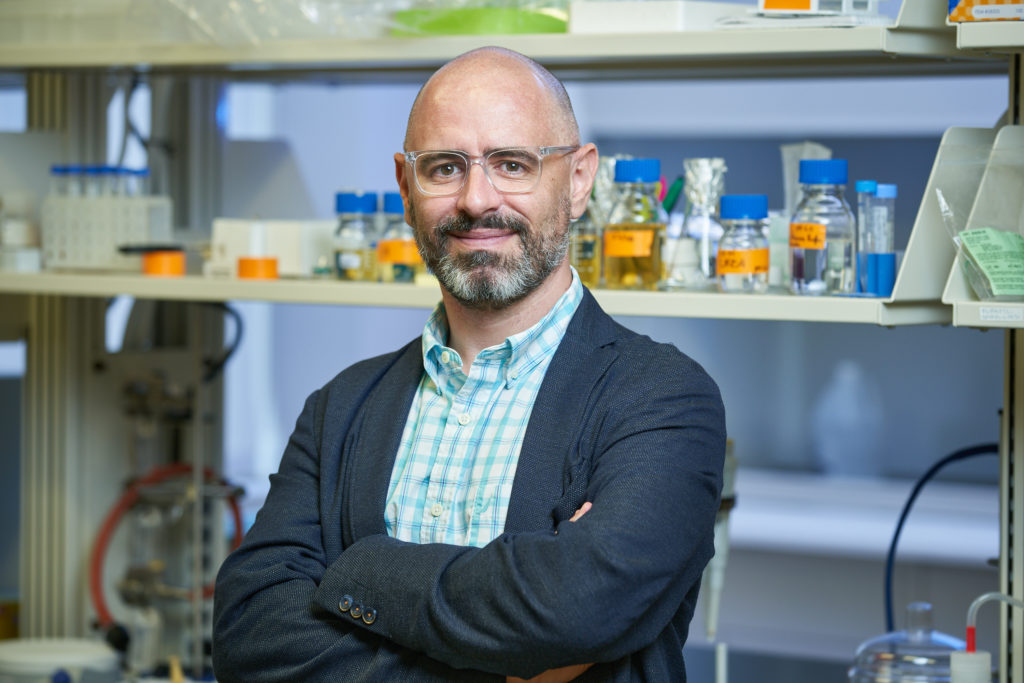
-
Jean-Philippe Pellois
- Associate Head for Research
- Focus Area: membrane biochemistry, molecular engineering and probe design, cellular delivery, cell injury and regeneration
- Office:
- BICH 436A
- Email:
- [email protected]
- Phone:
- 979-450-4817
- Graduate Education
- M.Sc. CPE, Lyon, France (1999)
- Ph.D. University of Houston, Houston, TX, USA (2002)
- Postdoc. The Rockefeller University, New York, NY (2006)
Professional Summary
Our group manipulates cellular membranes to facilitate a variety of cell biology, biotechnology, and therapeutic applications. We currently have three main foci: engineering cellular delivery tools that can cross biological membranes to carry useful cargos into cells; developing new ways to probe how cells work by using cell-permeable proteins; and exploiting the delivery of proteins into injured cells to promote tissue repair and regeneration.
Cellular delivery

We have developed a class of cell-penetrating peptides that can be used to deliver macromolecules into live human cells. These peptides can be simply co-incubated with a variety of cargos to achieve cellular internalization by endocytosis.
See Nat. Methods 11, 861-867 (2014).
We develop reagents that can cross membranes, penetrate cells, and deliver useful macromolecules inside human cells. These delivery systems include cell-penetrating peptides (CPPs); small-molecule modulators of membranes; artificial viruses that can deliver gene-editing tools into human cells and plants; and nanocages that encapsulate hard-to-handle drugs. For each, we develop chemical synthesis protocols, establish structure-activity relationships, and study their mechanism of action using biochemical and cellular assays. Through this work, we have uncovered several cellular gateways that allow access to the interior space of cells. Specifically, we have developed reagents that are remarkably efficient at entering cells by escaping the endocytic pathway.
J. Allen, K. Najjar, A. Erazo-Oliveras, H. M. Kondow-McConaghy, D. J. Brock, K. Graham, E. C. Hager, A. L. J. Marschall, S. Dubel, R. L. Juliano, J. P. Pellois, Cytosolic delivery of macromolecules in live human cells using the combined endosomal escape activities of a small molecule and cell penetrating peptides. ACS Chem. Biol. 14, 2641–2651 (2019).
A. Erazo-Oliveras, K. Najjar, D. Truong, T. Y. Wang, D. J. Brock, A. R. Prater, J. P. Pellois, The late endosome and its anionic lipid BMP act as gateways for the efficient cytosolic access of the cell-penetrating peptide dfTAT. Cell Chem. Biol. 23, 598–607 (2016).
Probing of protein function in live cells
Using our delivery techniques, we probe how proteins function inside cells. Recently, we successfully delivered proteins labeled with post-translational modifications (PTMs) or affinity probes (APs). For the former, this approach allows us to investigate how specific PTMs regulate what proteins do and where they go in a cell. In the latter, we are able to discover what proteins bind to in the context of a complex cellular environment. Simply put, we seek move classical biochemistry out of the test tube and into the cell.
Tissue regeneration
Injuries, whether caused by trauma, disease, or aging, initiate complex cellular responses that are fundamental to the healing process. At the heart of injury response is the intricate cell biology that governs tissue repair and regeneration. When tissues are damaged, a cascade of cellular events is triggered, involving inflammation, cell proliferation, differentiation, and tissue remodeling. Understanding these cellular mechanisms is crucial, as it lays the foundation for developing therapeutic strategies that can effectively manipulate these processes.
The challenge, however, lies in the body’s limited ability to regenerate certain tissues, particularly in the central nervous system, eyes, and cartilage. In these areas, injuries often lead to permanent damage due to the cells’ limited regenerative capacity. By delving into the cell biology of injury, we can uncover the molecular pathways that control these processes. This knowledge not only helps us understand why some tissues fail to regenerate but also opens up possibilities for developing innovative treatments. By learning to manipulate these cellular pathways, we can enhance tissue repair and regeneration, offering hope for recovery from injuries that are currently deemed irreversible. Our lab’s work is dedicated to exploring these frontiers, harnessing the power of cell-permeable protein biologics to unlock new regenerative capabilities.
All Publications
- View publications on National Library of Medicine